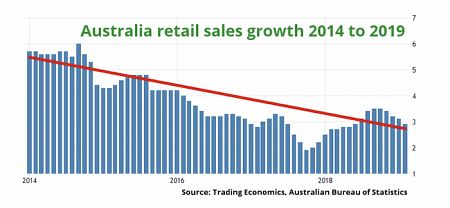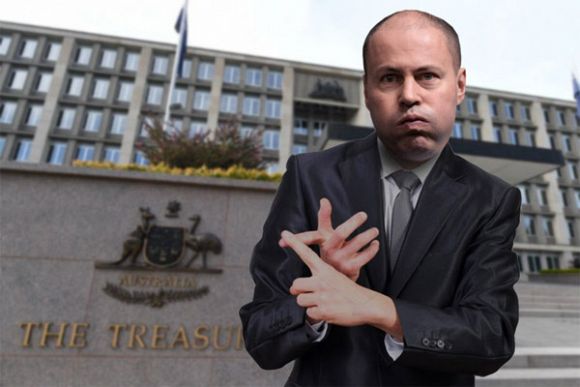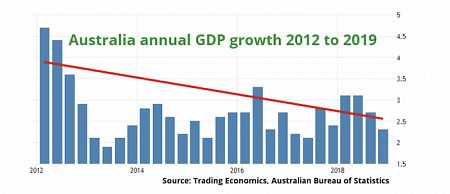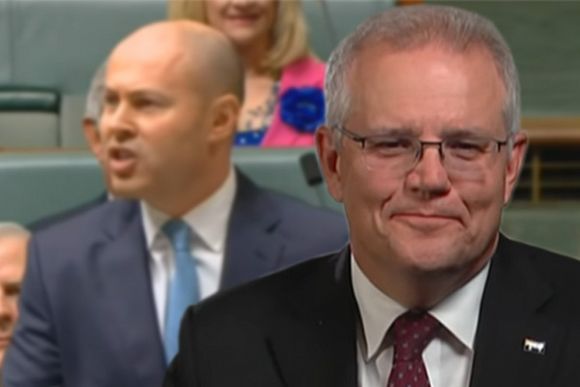The Coalition will say anything to gain your votes and since it's Federal Budget day, it's a perfect time to reflect on the lies told leading up to the 2019 Election.
Alan Austin analysed the falsehoods told by Treasurer Josh Frydenberg in this article from 2019.
FALSEHOODS have not always been a normal part of Australia’s electioneering. Nor has it always been the case that all mainstream media newsrooms have assisted the Coalition by refusing to expose their obvious lies.
But these are today’s realities. This means independent media must be extra vigilant. If they can enlist support from groups such as GetUp, non-government agencies, the religious communities and protest outfits like Juice Media, then so much the better.
It’s a tricky task. Clearly, independent media have fewer resources than multinational corporations. Many porkie pies are subtle and hence hard to detect. Some are a bit technical. So we need to identify them and also point to the data sources that show us what is actually true.
Here are ten misleading statements just from Treasurer Josh Frydenberg’s Budget speech last Tuesday (2 April), with links to the raw data.
1. "The Budget is back in the black”
Not quite. In June this year, the deficit will still be $4.16 billion. All the Coalition did last Tuesday was declare their faith in a surplus in June 2020, nearly 15 months away.
But we must remember this:
“We will achieve a surplus in our first year in office and we will achieve a surplus for every year of our first term.”
~ Joe Hockey, National Press Club, 16 May 2012
Remember also the August 2013 PEFO, written by Treasury head Martin Parkinson and finance chief David Tune. They showed that Labor's 2013 economic settings, if unchanged, would have produced a budget surplus in 2016-17.
2. “Australia is stronger than it was when we came to Government six years ago — growth is higher.”
Not true. Relative to Australia’s trading partners and competitors, the economy is weaker than it has ever been.
Through most of the Labor years, Australia’s annual growth in gross domestic product (GDP) was in the top six in the Organisation for Economic Cooperation and Development (OECD). In 2009, it was right at the top. Australia’s current growth rate – at a dismal 2.34% – ranks 112th out of 183 countries in the world, and 19th out of the 36 developed OECD members. These are the lowest rankings ever.
3. “Unemployment is lower"
Yes, the jobless rate at 4.95% is lower than the 5.71% at the time of the 2013 Election. But since then, the world has enjoyed a phenomenal boom in investment, growth, jobs and profits. But whereas jobless rates fell dramatically in most countries, Australia’s limped below 5% painfully slowly. This now ranks a lowly 17th in the OECD, down from sixth in 2013.
4. “We are reducing the debt and this interest bill”
This is the opposite of the truth. Debt has increased every year under the Coalition — despite promises in Opposition of “a reduction of $30 billion in net debt”.
When Labor took office in 2007, Australia's debt to GDP was third-lowest in the OECD. When Labor lost office, after the devastations of the Global Financial Crisis, Australia's debt was still third-lowest. Then came the strong global recovery. Australia's debt expanded through that period more than in any other OECD country. Bar none. Now, Australia's debt is ninth-lowest in the OECD.
5. “Only one side of politics can do this [eliminate Commonwealth net debt] because only one side of politics has done this; John Howard and Peter Costello paid off Labor's debt”
This is nowhere near the whole truth. The first government since Federation to substantially reduce gross and net debt was the Hawke/Keating Government from 1987 to 1990. They did this after a complete restructuring of the economy. Peter Costello continued that task on Paul Keating’s coattails.
6. “Following these changes, our tax system will remain highly progressive”
No, the top marginal rate in Australia will be 45%. Progressive, but not highly so. Top marginal rates are 48% in Ireland, 50% in Israel, 52% in Finland and the Netherlands, 56% in Denmark and Japan, and 61.85% in Sweden.
7. “Under the Morrison Government, tax as a share of the economy will not rise above the 23.9% cap ... taxes will always be lower under the Coalition”
History disproves this comprehensively. The tax take in Whitlam’s last year was 19.9% of GDP (Labor). This rose to 21.6% at the end of the Fraser years (Coalition). After 13 Hawke/Keating years this fell to 21.2% (Labor). This rose dramatically under Howard to finish at 23.8% (Coalition). It fell again during the Rudd/Gillard years, ending up at 21.3% (Labor). The tax take increased markedly after the Coalition won the 2013 Election, up to 23.3% in last week’s Budget.
8. “Additional tax relief for small and medium-sized businesses ... the engine-room of our economy”
Cutting company taxes does nothing whatsoever to help unprofitable businesses. It only hands money to those already making strong profits. Struggling businesses need lower operating costs and higher revenue, which requires more spending money in customers’ pockets.

9. “This Government has been at the forefront of global efforts to crack down on multinational tax avoidance”
Completely false. In its first year, the Coalition axed 4,400 Tax Office jobs, including many in audit roles. The Tax Office’s transparency report and other documents confirm avoidance has soared under this Government. Company tax is now virtually optional for the large, highly profitable, foreign corporations.
10. “Six years ago when we came to Government, the economy was weakening ... Since then, we have made the right choices ... and our economic plan is working”
Again, the diametric opposite is true. In 2013, Australia’s economy was the best-performing in the world by a significant margin. It now ranks 21st in the world on the IAREM.
Deteriorations since 2013 in OECD rankings include:
- the rate of annual wage rises, down from seventh to 21st;
- gross national savings, down from ninth to 19th;
- gini coefficient (equality of wealth distribution), down from 12th to 29th;
- budget deficit as a percentage of GDP, down from ninth to 25th; and
- growth in the volume of exports of goods and services, down from fourth to 18th.
Voters will soon be able to reverse all this. That, fortunately, is true.
Alan Austin is an Independent Australia columnist and freelance journalist. You can follow him on Twitter @alanaustin001.
 This work is licensed under a Creative Commons Attribution-NonCommercial-NoDerivs 3.0 Australia License
This work is licensed under a Creative Commons Attribution-NonCommercial-NoDerivs 3.0 Australia License
Support independent journalism Subscribe to IA.















